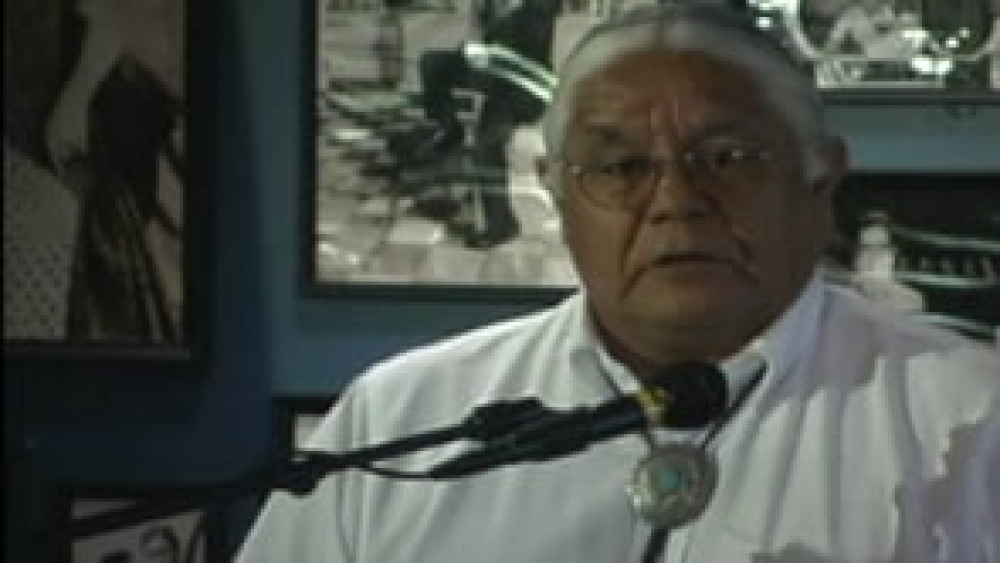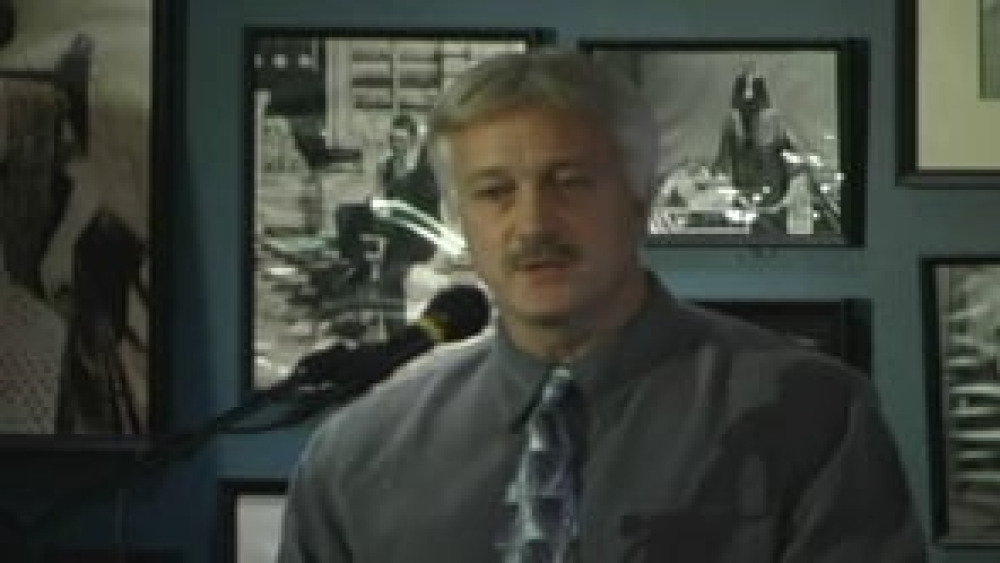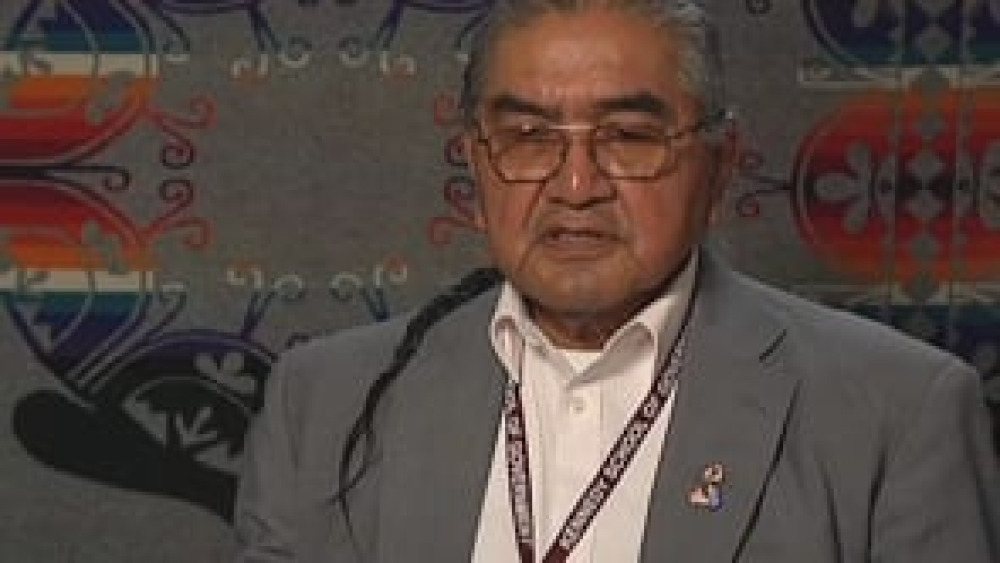"Forward-thinking" is often used to describe innovative programs. In remarks designed to frame the symposium session "So You Have a Great Program...Now What?!", Manley A. Begay, Jr. talks about strategic orientation, planning, and implementation as critical to sustaining the success of tribal programs, including how they stay financially healthy, how they deal with changing missions and needs, and how they maintain their effectiveness.
Additional Information
Begay, Jr., Manley A. "So You Have a Great Program...Now What?!" Honoring Nations symposium. Harvard Project on American Indian Economic Development, John F. Kennedy School of Government, Harvard University. Cambridge, Massachusetts. September 11, 2004. Presentation.
Transcript
Amy Besaw Medford:
"To start the session off we'll have Manley Begay come up again, the co-director of the Harvard Project and also the director of the Native Nations Institute. Manley is a great friend and I hope that you learn a lot from his words."
Manley Begay:
"This is the second-to-the-last session and the session is called "So You Have a Great Program, Now What?" [Laughter] And my wife would say, 'whatever.' [Laughter] I wanted to just once again say hello to each of you and also just acknowledge Amy Besaw and Andrew Lee and Carmen Lopez and the staff, Liz Hill outside and also Liza Bemis, and am I forgetting anybody? And the fine work that they're doing, so we should give them a round of applause. [Applause] They're wonderful people and in the past 16 years or so that I've been working with the Harvard Project, I've come across many wonderful people and each time we connected with these individuals we held onto them pretty tightly.
Originally back around 1987, Joe Kalt was actually wrestling with an economics question and Joe was puzzled by the fact that as he was studying the U.S. Forest Service land in central and eastern Arizona he was puzzled by the fact that right next door was the White Mountain Apache tribal forest area and as all good economists, you know, he's running numbers and trying to figure things out sort of numerically and so forth and what he was trying to figure out was why is it that all of a sudden in this work he ran across the fact that White Mountain Apache Tribe was managing their forest land better than the U.S. Forest Service was managing theirs. So he was faced with this question and he couldn't figure it out. And Joe began to think well, 'I guess economists really don't rule the world' [Laughter], or they like to think they do and he said, 'I've got to find something else about what's going on here.' He said, 'There's got to be somebody here at Harvard that knows something about Indians.'
So he starts looking through the phone book and asking people questions, 'Who here at Harvard knows about Indians, besides the anthropologists?' [Laughter] And lo and behold he runs across Steve Cornell. Steve was in the Sociology Department at that time and lo and behold Steve was working on a book and I think just finished a book called The Return of the Native. So the two of them have lunch and Joe poses his question and lo and behold, the Harvard Project was born. A short time later, a year or so later, I arrived here at Harvard to work on a doctorate at the Graduate School of Education and I answered a work study ad, it was on the bulletin board at the Harvard [University] Native American Program office and so I went to go see Joe Kalt at the Kennedy School. So I sat down with him and we talk for, gee, it seemed like two, three hours, so I figured I was hired, you know? [Laughter] And became one of the first research assistants for the Harvard Project. And there was another guy that was working there at that time with Joe and Steve, a gentleman named Karl Eschbach. Carl has a wide range of interests from baseball to English tea. Interesting fellow, Carl, wonderful guy, was there working with Joe and Steve. And then Carl and I shared an office and had many good conversations and fast got to know Carl as a wonderful human being. And a short time later, Steve actually was here for maybe another year or two and then went off to University of California-San Diego and then I was fast promoted to the executive director position, which is what Andrew holds at the current time, and began to work with the Harvard Project. So for the next 15 years or so, I was here. Finished my doctorate, received a position at the Graduate School of Education, and became one of the [Harvard Project] co-directors along with Joe and Steve.
And in the course of the 15 years or so that the Harvard Project has been around and working in Indian Country, many wonderful individuals came our way and I think many of them stayed with us. And they've formed their own careers and formed their own interests about the work of nation building in Indian Country. Among these individuals are Jonathan Taylor, Kenny Grant, Eric Henson, Miriam Jorgenson, Elise Adams, and Harry Nelson. Harry is currently at the University of British Columbia in Vancouver and I was thinking about this today and those individuals I just mentioned were all students here at Harvard. Many of them were at the Kennedy School of Government. And we've not only become fast colleagues in this work, but have become good friends and individuals that you know you can trust and respect. So this is sort of the team that has formed the Harvard Project.
And a short time later, after Andrew graduated from the Kennedy School of Government and was working at the Ford Foundation, Andrew called and wanted to return back to Harvard and see about finding a place within the Harvard Project. So he brought along with him this idea of the Honoring Nations program, which I believe he and Michael Lipsky had talked about for quite some time. So Andrew came and joined the Harvard Project again and Andrew for the longest time single-handedly put the Honoring Nations program together and I think if there's anybody to be touted as the father of the Honoring Nations program, it is Andrew Lee. [Applause]
And it's wonderful to see that Carmen Lopez is doing a great job with the Harvard University Native American Program. And Carmen has a little known distinction probably among all of us -- except for me-- that she's a fantastic volleyball player. And she and my daughter played volleyball at Dartmouth College and I always admired Carmen when she played high school volleyball. That's when I first noticed her, and Carmen is doing a wonderful job here at Harvard and it's good to see her once again.
I wanted to just make a brief statement about 'So You Have a Great Program Now, Whatever.' [LAUGHTER] But what I want to talk about is sort of forward thinking. I want to talk about strategic orientation, long-term planning and thinking, about sort of setting the context for my brother Lenny Foster and also, who else is speaking? I forget who else is speaking. I know it's not Don Sampson. Rick George will come up after me. But I want to talk about, 'Okay, so now what? Where do we go with all of this? What do we do? How do we begin to think about the future?'
And I think strategic orientation really is a shift from reactive thinking to proactive thinking. It's not just responding to crisis but trying to gain some control over the future. Trying to gain some control over the future, try to figure out where are we headed, what are we all about. And it's about a shift from short-term thinking to long-term thinking. Twenty-five years, 50 years from now, what kind of society do you want? What kind of society do you want to create? It's a shift from opportunistic thinking to systemic thinking, focusing not on what can be funded, but how each option fits the society you're trying to build. It's a shift from a narrow, problem focus to a broader focus on the community. Fixing not just the problems, but societies. Very much like what is going on throughout the world.
I think Joe at his opening address talked about our trip to Poland, and while in Poland you can tell they're working on trying to fix the society after colonization had occurred, first with Germany and then with the Russians. And in some of my trips abroad to places like Australia and New Zealand and South Africa you know that these countries are facing some tremendous problems and issues, not unlike Indian Country. South Africa faces problems with law enforcement. Russia is facing problems with law enforcement. And you go to places like Australia, where Australia, New Zealand, and Canada are essentially commonwealth countries and still wrestling with some basic issues that we've somewhat resolved here in the U.S., like land, human rights, justice. Not that we don't continue to fight for those things, but the issues in many of these countries are some 50, maybe even 100 years back, from what we're dealing with here in the U.S. And in Indian Country today, we're faced with some key strategic questions. You know, what kind of society are we trying to build, what kind of society are you trying to build? What do you hope will be different 25, 50 years from now? What do you hope will be the same? What do you wish to protect? What are you willing to change? What assets do you have to work with and what makes sense to the community at large? And this is all in the context of a hard-nosed look at the reality requirements of your situation.
So essentially it's our job as leaders and you as leaders from your respective nations to begin to think about, how do you want your kids to live or their kids to live 100 years from now? What kind of clothes will they be wearing, what language will they be speaking, where will they be living, what kind of home will they have, how will they worship, where will they go to school, how much education will they have, what about cultural education? And these are all very tough and, I think, thought-provoking set of questions. And it's really about determining nationhood, determining what shall we look like 100 years from now. And then how will we be remembered as leaders? What sort of legacy are we going to leave? Those -- and I talked a bit about this the other day -- those that are yet unborn, what are they going to be saying about us? 'Oh, that guy, that person, did this and to this day we live in this fashion and this manner.' What kind of legacy are you going to leave? I think it's a question we must all wrestle with because life is short. Life is very short and we don't have much time to waste because there's a lot of work to be done.
And I think answering those questions requires a tremendous amount of leadership, and I'm just deeply honored to be in your presence because you're working hard, you're doing things that need to be done, and as leaders we have a tremendous amount of responsibility because leaders create or destroy a climate in which success can occur. They set a vision or not of where the nation is headed. They create or undermine institutions capable of effectively implementing a national vision. They create or abuse the rules of the game. They send signals that decisions will or will not be made by the rules and their fair interpretation. So in short, leaders make choices and their choices matter. And as all of us are leaders in one form or fashion. The choices we make matter and effective nation building depends on those good choices that we make. Thanks. [Applause]"



